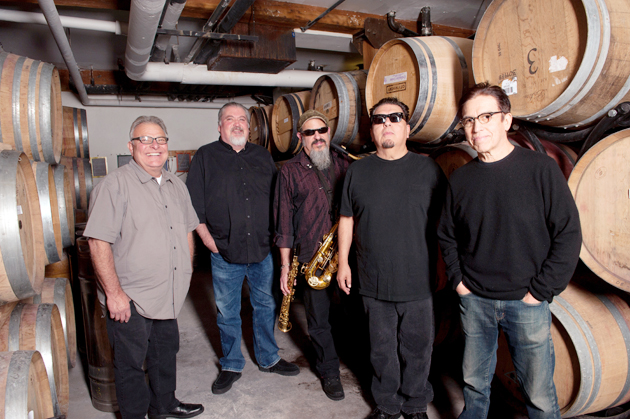
The tour leg that swings Los Lobos through Boulder this weekend is something of a victory lap for the East Los Angeles-bred band. It comes just after their December release of Disconnected in New York City, a live chronicle recorded during a three-night stand at the City Winery in Manhattan last year to celebrate the band’s four decade mark.
But if Los Lobos is unafraid to lay claim to its own tenure, it also isn’t as if they made a special effort to pull out the special-occasion threads to commemorate it. Like the clock-puncher who slinks into the office on his own birthday, Los Lobos just does what they’ve always done. Work the road.
“It’s pretty much where we live, for better or worse,” reedman/keyboardist Steve Berlin told us.
“But we’re amazingly lucky. I was just having coffee with a friend of mine; we were talking about how hard it is for a band that starts today, or even five years ago, to achieve anything like this. We were so lucky to start in an era when you could build a fanbase that wasn’t… fickle. It’s just tough, I think, to cultivate a really long relationship with fans these days. … It’s not something that we really thought about a lot, but I think we all realize now that we’re incredibly blessed to still have fans who come out to our shows.”
Without new material to promote (their last studio release, Tin Can Trust, came out in 2010) and a stripped down instrumentation (no electric instrumentation, except for Conrad Lozano’s bass), the band is free to extend the nightly set list over their entire catalogue, including rarely-performed acoustic numbers.
The passage of time has an inevitably leveling effect, as the new live record includes the zydeco-inflected two step “Gotta Let You Know” from the 1984’s How Will The Wolf Survive to “Tin Can Trust” from 2010 and the guilt-free indulgence of the band’s landmark-turned-albatross-turned staple cover of “La Bamba.” You’re left with the sense that Los Lobos is finally able to embrace its history. All of it.
In retrospect, the project seems a no-brainer, but Berlin said that, in a perverse kind of way, it presented the outfit with something of a challenge.
“We were sort of stumbling around trying to figure out how to properly commemorate this long of a career. Y’know, it’s tough. I don’t think there’s an easy way to make another record that said, ‘Here’s 40 years’ worth of what we’ve done.’ It’s hard enough just to make good ones, much less having to carry that weight.
“So we thought, what could we do? We’ve done an acoustic record, we’ve done a record with guest artists. … We’ve already done so many of these permutations. We were kind of stuck — like what haven’t we tried? So we sort of hit on this idea: There’s a bunch of songs people have been requesting for a long time, songs that we hadn’t taken the time to relearn or just didn’t seem like a fit with how we sound today.
“So the idea of this ‘disconnected’ show came up, and we got three shots to do something. And it was a good thing we got three, since two of them weren’t that good,” he laughed. “But one was really great, fortunately.
“And it’s been fun. … I think some of the guys maybe don’t like us not having 200 watts of power behind them every night, but the band really enjoys it. We’ve sold out virtually every show so far. And it’s kind of fun hearing these songs in this new space, like hearing the song without all the noise.”
We told Berlin it reminded us of a couple Chautauqua gigs back in the ’90s; although billed as acoustic shows, inevitably the amps got turned up and the Les Pauls came out to bounce the dust off the auditorium’s rafters, rattling the good citizens living up near Bluebell Preserve, almost as if the band just couldn’t help themselves.
Berlin remembered those gigs and laughed.
“Well, we’re not even bringing electric guitars along with us, to keep that from happening.”
For his part, Berlin keeps a busy schedule outside the band’s road time, not that there’s a lot of it. He recently worked with longtime friend David Katznelson to contribute liner notes to It’s A Scream How Levine Does The Rhumba, a meshuge shisl of Jewish-performed/themed Latin music from the mid-20th century as well as a live performance film score for a 1928 Russian Yiddish silent film called His Excellency, a project sponsored by the Idelsohn Society, an organization cofounded by Katznelson dedicated to the preservation of Jewish musical heritage.
Nearer to the hearts of Boulder music fans, Berlin also produced Leftover Salmon’s renaissance CD from 2012, Aquatic Hitchhiker. The CD and subsequent tour marked a milestone for the band and initiated a second rising arc in their lengthy career.
But characteristically, Berlin shrugs off too much credit for all that.
“I loved working with those guys…but it wasn’t me. They were in there, committing to be together for at least a couple of years and being a band again. It was a blast. They were true gentlemen and I loved hanging out and making music with them.”
Respond: [email protected]














